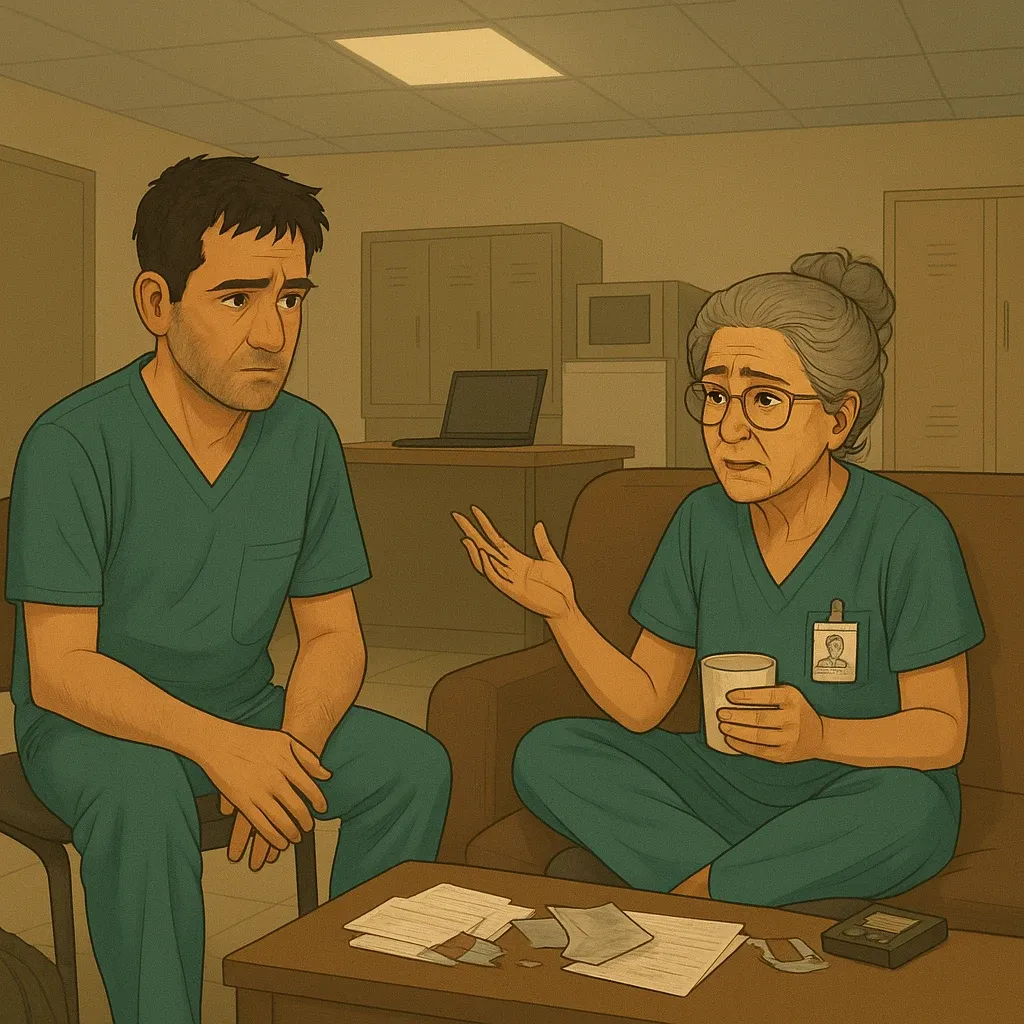From the Soul on Call series
Note: These reflections are fictional and intended for educational and reflective purposes only. They are not medical advice, are not based on any specific individual, and do not represent the views of any employer or institution.
The resident lounge had been temporarily rebranded as a call room.
Two chairs, one couch, and a subtle smell of instant noodles mixed with something harder to name—panic, maybe. Or regret.
Dr. Solan Call stepped inside and paused.
The fluorescent light above him buzzed like it wanted to leave.
Dr. Frankie Whirl was already there.
Pediatrics. Known across Overcare for her sharp instincts, relentless energy, and ability to pivot from chaos to calm like it was a clinical skill.
She was the kind of doctor who could disarm a room with a joke—or accidentally set one on fire with her honesty.
Tonight, she looked more unravel than calm.
She sat cross-legged on the couch like a caffeinated oracle.
Her hair was twisted into a loose topknot.
A tangle of half-filled progress notes, tea bags, and a protein bar wrapper surrounded her like a personal weather system.
Her pager blinked quietly on the armrest.
God, I’m not okay,
she said, before he’d even closed the door.
Solan nodded—automatic, practiced.
He set his bag down gently, as if not to disturb something fragile. Or volatile.
Frankie launched into it.
Her patient in 4 had accused her of being “emotionally manipulative.”
The team had backed her up, but the words had stuck.
Am I though?
Like… maybe I am. My therapist says I tend to merge.
She laughed—quick, sharp, too loud.
You can see that, right?
She didn’t wait for an answer.
She couldn’t.
She needed to outrun the stillness.
Solan sat on the edge of a desk chair, trying to land somewhere between compassion and neutrality.
But his body had its own script—shoulders tense, heart a beat too fast.
He could already feel the emotional draft in the room—the subtle pull to absorb, to contain, to disappear.
Frankie kept going.
Residency trauma.
Her ex who ghosted her during fellowship.
Whether pediatrics had made her more sensitive or just less sane.
She was unraveling with fluency—like someone used to translating her pain for others.
Each topic delivered with a manicured layer of insight, a punchline to soften the blow.
But underneath it was something raw.
A quiet hope that maybe Solan could hold it all with her—just for a moment.
Not fix it. Not solve it. Just stay.
The ceiling light flickered again.
Solan’s mind did the same.
He nodded.
Made a soft “mm.”
Tried to track.
By the time she circled back to her therapist, his left foot had gone numb.
His neck ached.
His coffee was cold.
He hadn’t said more than three full sentences.
Frankie paused, breath sharp.
Looked at him.
Am I too much?
Solan blinked.
His reflex answer came first: No, no, of course not, you’re fine.
But something deeper stalled.
Because if he said no… it meant his own discomfort didn’t count.
He looked at her—really looked this time.
Her vulnerability was real.
So was her velocity.
And in the space between them, something had taken root: an unspoken contract.
She would bleed. He would absorb.
He exhaled through his nose.
I think you’re hurting.
And maybe also… looking for someone to hold it all with you.
Frankie’s face flickered—pride, then shame, then soft exhaustion.
Solan continued, gently:
And maybe I’m not the right someone tonight.
Silence.
Heavy, but honest.
Frankie nodded. Once. Small. Almost involuntary.
Yeah.
Okay.
That’s… fair.
She leaned back into the cushions, her eyes drifting upward to the water-stained ceiling tile.
One hand still gripped her pager.
She hadn’t meant to offload.
Not really.
She just didn’t know where else the feelings could go.
Solan turned toward the desk, letting the silence settle.
He didn’t need to fix it.
He just needed not to disappear in it.
And yet.
As he opened his laptop, a flicker of something twisted in his chest.
Guilt? Maybe.
Or just the old reflex—the one that said you have to hold everything, or you’re failing someone.
He wasn’t sure.
All he knew was that boundary didn’t always feel like relief.
Sometimes, it just felt like weight redistributed.
Outside, the hallway was quiet.
The unit lights had dimmed.
One of the monitors let out a showy little beep, then quieted down.
He could still feel her emotions vibrating in the air like static—
but they weren’t his to metabolize.
Not tonight.
He returned to his notes.
This time, on his own patient.
🌱 Want to unpack the emotional fine print?
If you've ever walked away from a conversation feeling drained—but unsure why—this week’s Soul Kit might help.
Reading the Fine Print (free email subscription needed to unlock)
It’s not a fix. Just a quiet space to notice what you’ve been holding—and whether it was ever really yours.
Want to keep going?
One email a week with the latest story and Soul Kit.
